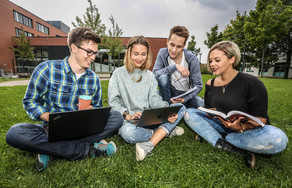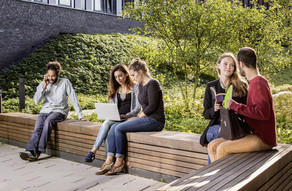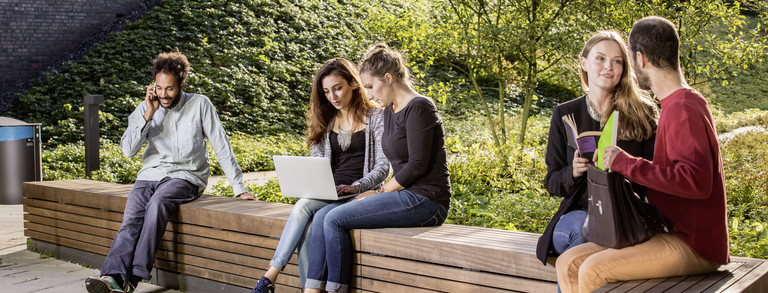English-taught Courses
Here you can find all courses that are taught in English at the Department of Social Sciences. Please note that short-term changes in the course portfolio may occur!
Erasmus and Exchange students may also take courses from other Departments. Suitable courses can be found at the Department of Philosophy and Politcal Science, Department of Educational Sciences and Psychology, Department of Rehabilitation Sciences, Department of Humanities and Theology, and Department of Cultural Studies, and other.
A complete course catalogue of the TU Dortmund can be found here.
Winter semester 2024/25
Docent: Kaletka
Thursday 12-2 p.m.
Place: Emil-Figge-Street 50, Room: 2.512
Environment and innovation are important keywords for looking at social development processes. In this seminar, basic concepts and theories of social science innovation research are presented and discussed. Central topics include the analysis of the connection between innovation and social change and its significance in the context of concrete social transformation processes (such as the energy transition, transport transition, formation of new consumption patterns, etc.). Concepts and empirical findings from social science innovation research as well as its history and development form the focus of the seminar. Special attention is paid to social theories that focus on the connection between innovation, social change and social transformation and analyze the interaction between technological and social aspects. At the same time, the seminar asks about the contribution of social science innovation research to reflecting on and overcoming societal challenges. Within the scope of the seminar, current and future-oriented topics and developments of social-scientific innovation research are taken up.
Docent: Schubert
Monday 2-4 p.m.
Place: tba
Science and technology are central fields of social change. Developments in science and technology are often even seen as the main drivers of social change. The course introduces the core ideas and approaches in the field of Science and Technology Studies (STS). It draws specifically on the sociology of science and the sociology of technology. By reading and discussing exemplary studies and canonial texts, the students will gain an in-depth understanding of the relations of science, technology, and society. They will be able to identify the main theoretical approaches and relate them to overarching issues in sociology, such as knowledge, power, and social change. The course is organized in weekly meetings to discuss the relevant literature. Students will hand in short memos on each text and actively engage in the classroom discussions. In small groups, students will select a "mundane" technology that they will analyze over the duration of the course and present in form of a short video clip (1-3 min) at the end. English is the primary language for conversation. You should have a good command of English, but do not need to be perfect or fluent.
Docent: Wittkowski
Thursday 4-6 p.m.
Place: Emil-Figge-Street 50, Room: 2.437
Whose insecurities matter under which circumstances, and to whom? This class focuses on selected problems of social inequalities and cultural differences through the lens of security. In current times, questions of (in)security are applied to radically diverse domains, permeating and influencing almost every part of human activity and everyday life. Taking into consideration theoretical challenges, empirical findings, and contemporary discourses, we will discuss in which different ways 'security' and its constitutive counterpart 'insecurity' structure subjectivities and practices. Special emphasis is given to the relation of security techniques (e.g. biometric data collection) and social inequalities. Starting with Foucault's works on societies of security, we will trace their developments and closely examine the multiple shifts in security practices that occurred since 9/11 while also taking a closer look at several concepts intricately connected to questions of security and inequalities, e.g. risk, biopolitics, concepts of normality.
Docent: Patch
Thursday 12-2 p.m.
Place: Emil-Figge-Street 50, Room: 2.437
This seminar introduces the life course and biographical approaches in social science. Students will encounter empirical qualitative research that illuminates how our life course trajectories are influenced by social structures and norms. We will look at changes in human lives individually over chronological age and collectively within and across different generations or cohorts. Students will learn about central domains of sociological interest through focusing their temporal dimension. Furthermore, students will have the opportunity to reflect on recent theoretical and methodological conceptualizations in life course and biographical research.
Docents: Brandt, Komp-Leukkunen
Dates:
Wed., 20.11.2024, 4-6 p.m. (preliminary meeting, via Zoom)
Fri, 29.11.2024, 2-6 p.m.
Sat, 30.11.2024, 10 a.m. - 6 p.m.
Fri, 06.12.2024, 2-6 p.m.
Sat. 07.12.2024, 10 a.m. - 4 p.m.
Place: Emil-Figge-Street 50, Room: 2.512
Docent: Motakef
Wednesday 12-2 p.m.
Place: tba
Ageing societies are not only characterized by age-related changes, i.e. increasing life expectancy with a declining birth rate. Rather, ageing societies are also seen as giving greater visibility to demands for equality and the diversity of lifestyles. Nevertheless, social institutions are still not sufficiently oriented towards the "normal case of diversity". Heterosexuality and a "normal biography" are usually implicitly assumed. In the seminar, we discuss approaches from gender studies and queer studies in which gender and sexuality norms and notions of normality are negotiated. In a first step, we elaborate on theoretical concepts and methodological approaches from queer and sexualities studies (normality and norms by Foucault and Butler) and gender, family, and new childhood research ("doing gender", "doing family"). In a second step, we discuss empirical studies from different biographical stages such as "trans* kids", "multilocal families" and "queer ageing".
Docent: Wilkesmann
Tuesday 12-2 p.m.
Place: Emil-Figge-Street 50, Room: 2.512
Docent: Summer
Tuesday 4-6 p.m.
Place: Emil-Figge-Street 50, Room: 2.512
The environment and innovation are important keywords for focusing on social development processes. In this module, fundamental concepts and theories of environmental sociology and innovation research are presented and discussed. Central topics include analyzing the connection between innovation and social change and its significance in the context of specific social transformation processes (such as the energy transition, transport transition, development of new consumption patterns, etc.). In addition, the interweaving of social and ecological development paths is analyzed from an environmental-sociological perspective, for example with regard to the social conditions of potential coping strategies, and the discursive framing and function of sustainability concepts used is questioned. The overall module 5.6 (Environment & Innovation I) is completed with a written examination, which covers content from both sub-modules.
Docent: Zagel
Monday 2-4 p.m.
Place: Emil-Figge-Street 50, Room: 2.437
Summer semester 2024
Docent: Zirngiebl
Thursday, 12-2 p.m.
ECTS: 4
Place: Emil-Figge-Street 50, Room: 2.109
Environment and innovation are important keywords for looking at social development processes. In this seminar, basic concepts and theories of social science innovation research are presented and discussed. Central topics include the analysis of the connection between innovation and social change and its significance in the context of concrete social transformation processes (such as the energy transition, transport transition, formation of new consumption patterns, etc.). In addition, the interconnectedness of social and ecological development paths is analyzed with regard to the social conditions of potential coping strategies and their significance in the sustainability discourse is questioned. Conceptual foundations and empirical research results of social science innovation research as well as its history and development. Special attention is paid to theories that focus on the connection between innovation, social change and social transformation and analyze the interaction of technological and social aspects. At the same time, the seminar asks about the contribution of social science innovation research to reflecting on and overcoming social challenges.
Docent: Schubert
Monday 2-4 p.m.
4 ECTS
Place: Emil-Figge-Street 50 - Room 2.437
The course introduces the core ideas and developments in the field of Science and Technology Studies (STS). It draws specifically on the sociology of science and the sociology of technology. Students will learn about approaches such as the Empirical Program of Relativism, the Social Construction of Technology, and Actor-Network Theory as well as about lines of research such as feminist STS, science communication, and technology assessment. By reading and discussing classic texts, the students will gain an in-depth understanding of the relations of science, technology, and society. They will be able to identify the main theoretical approaches and relate them to overarching issues in sociology, such as knowledge, power, and social change. The course is organized in weekly meetings to discuss the relevant literature. Students will hand in short memos on each text and actively engage in the classroom discussions.
Docent: Patch
Thursday 12-2 p.m.
Place: Emil-Figge-Street 50, Room: 2.105
This seminar introduces the life course and biographical approaches in social science. Students will encounter empirical qualitative research that illuminates how our life course trajectories are influenced by social structures and norms. We will look at changes in human lives individually over chronological age and collectively within and across different generations or cohorts. Students will learn about central domains of sociological interest through focusing their temporal dimension. Furthermore, students will have the opportunity to reflect on recent theoretical and methodological conceptualizations in life course and biographical research.
Docent: Brandt
Thursday 10-12 a.m.
Place: Emil-Figge-Street 50, Room: 2.512
5 ECTS
Social networks and their analysis have increasingly got into the interest of different fields of social sciences. In this seminar, students will learn definitions and theoretical concepts of social networks and get an in-depth look at social network research. By reading and discussing quantitative empirical studies, special intention is paid to the stability and change of social networks over the life course against the background of social and demographic change. We will especially look at the role and importance of social networks in old age. The students will reflect the relevance of social networks and social capital in ageing societies and their meaning for social inequalities. In addition, we will look at innovative ways of interventions to strengthen social cohesion.
Docent: Schubert
Wednesday 2-4 p.m.
Place: Emil-Figge-Street 50, Room: 2.437
5 ECTS
In this seminar, we discuss the social construction of audiences and their role in society. The focus lies on the construction of digital audiences, asking how technology affects audiences, their relations to production and the social formation and organization of the public sphere. On the basis of weekly readings, students get to know sociological theory as well as empirical case studies on audiences. This includes literature about practices and technologies of reception, consumption and reviewing in audiences (such as newspaper readers, gamers, podcast listeners, live crowds, museum visitors, social media followers, etc.) as well as practices of monitoring, assessing and understanding (or 'imagining') audiences during production. Finally, we also discuss academic practices and methodologies of audience construction, to comprehend and reflect upon the production of sociological knowledge. The course is organized in weekly meetings to discuss the relevant literature. Students are asked to actively engage in the classroom discussions and hand in short written weekly assignments which can form the basis of the final examination (oral exam or term paper).
Docent: Trischler
Tuesday 4-6 p.m.
Place: Emil-Figge-Street 50, Room: 2.437
In today's digitally connected and technology-driven world, the relationship between the human body and technology is undergoing profound transformations. This undergraduate course offers an in-depth exploration of how both the body and technology, as social constructs, intersect and co-evolve, shaping our interactions, identities, relationships, and society as a whole. This course provides a critical examination of the social, as well as the ethical, and political dimensions of the complex interplay between bodies and technologies. Through weekly readings, we will discuss different sociological approaches to technology and the body (such as symbolic interaction, discourse analysis, practice theory or post-humanist theories) and look at different areas of their intersection (such as medicine, dis/ability, sexuality, sport, digital identities or surveillance). Throughout the course, students will critically analyze primary texts, engage in discussions, and work on research-oriented assignments.
Winter semester 2023-24
Docent: Angelika Poferl
Date: Tuesday, 12-2 p.m.
Place: n.n.
ECTS: 6
The seminar deals with selected problems of social inequalities and cultural differences. Empirical findings as well as theoretical-conceptual challenges and political-practical developments are discussed. The focus is on global problems of social inequality and cultural difference (e.g. global poverty, gender relations, ecological risks), the guiding idea and semantics of social, cultural and ecological human rights as well as forms of global civil society engagement (e.g. 'global citizenship'). Particular attention is paid to the link between globality and locality and to social and cultural transformations.
For Introduction: Chen, Cher Weixia & Renteln, Alison Dundee (2023). International Human Rights. A Survey. Cambridge: Cambridge University Press. Further literature will be announced in the seminar.
Docent: Claudius Garten
Date: Wednesday, 2-4 p.m.
Place: n.n.
ECTS: 6
The course will address:
- conceptual perspectives and measurement of health and well-being;
- theoretical foundations and multidisciplinary perspectives on health and well-being;
- empirical findings on health and well-being in concrete areas of application
Students will learn about know central concepts, findings and methods from social science research on health and well-being research. They will be able to classify and reflect on relevant content in corresponding discourses. They will engage in reading and analyzing scientific texts and put the results of the analysis into an appropriate written form.
Docent: Sabine Lauer
Date: Monday, 10-12 a.m.
Place: n.n.
ECTS: 6
The seminar deals with selected topics of the sociology of education, especially with educational inequalities. These will be jointly elaborated and discussed on the basis of classics of the sociology of education (Gary S. Becker, James S. Coleman, Pierre Bourdieu and Raymond Boudon)
Docent: Holly Patch
Date: n.n.
Place: n.n.
ECTS: 5
In this advanced seminar on biographical research, students will deepen their understanding of how social structures and historical processes contextualize and help shape individual lives and collective experiences. Discussing methodological approaches and empirical studies, students will learn about how life histories are (re)constructed and narrated.
- Rosenthal, Gabriele. 2004. biographical research. In: C. Seale, G. Gobo, J. F. Gubrium, & D. Silverman (Eds.), Qualitative Research Practice. London: Sage, 48-64.
- Caetano, A. and Nico, M. 2022. Biographical Research Challenges and Creativity. Routledge.
- O'Neill, M. 2014. Participatory Biographies: Walking, Sensing, Belonging. In: O'Neill,M., Roberts, B., & Sparkes, A. (Eds.). Advances in Biographical Methods: CreativeApplications (1st ed.). Routledge, 73-89.
Docent: Christian Deindl
Date: Wednesday, 12-2 p.m.
Place: n.n.
ECTS: 5




